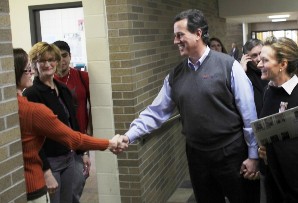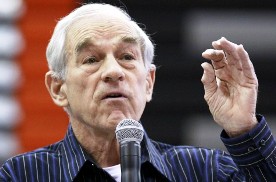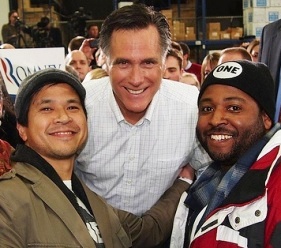
Finally, some voting! (Well, some caucusing, really, but it’s practically the same thing.) Tuesday’s evening of Republican politicking in Iowa told us little to nothing we didn’t already know about the GOP field, but it did leave a distinct impression about the party’s base — a distinct odor, really. It’s the whiff of desperation, the stench of a mob that has worked itself into a sweat railing against all the stuff it doesn’t want … but can’t begin to agree on what it does want.
And how is a party that can’t answer a simple question — what, exactly, are you for? — supposed to run a country?
 The issues that divided the Iowans who voted variously for Mitt Romney, Rick Santorum and Ron Paul are not small ones, and my guess is that they won’t be resolved quickly or easily. That’s not to say the GOP nominating contest will drag on terribly long, or be particularly suspenseful; my guess is that Romney, coming out of next week’s big win in New Hampshire, will simply out-organize and outspend the poorly funded (and that’s being generous) Santorum into submission by the end of the month. Romney may not win South Carolina — who will win it is anybody’s guess, and doesn’t really matter — but once Floridians vote in late January Romney will be able to coast into the summer, with Paul serving as little more than the belligerent schnauzer nipping at his heels.
The issues that divided the Iowans who voted variously for Mitt Romney, Rick Santorum and Ron Paul are not small ones, and my guess is that they won’t be resolved quickly or easily. That’s not to say the GOP nominating contest will drag on terribly long, or be particularly suspenseful; my guess is that Romney, coming out of next week’s big win in New Hampshire, will simply out-organize and outspend the poorly funded (and that’s being generous) Santorum into submission by the end of the month. Romney may not win South Carolina — who will win it is anybody’s guess, and doesn’t really matter — but once Floridians vote in late January Romney will be able to coast into the summer, with Paul serving as little more than the belligerent schnauzer nipping at his heels.
That’s the way Republicans do things, organizationally speaking — they coalesce early, and move on to the bigger fight. But that’s the easy part — the establishment settling on a frontrunner and clearing his path. The trouble is that the frontrunner isn’t really the man for his moment. Has there ever been such a disconnect between the obvious passions of a party’s base and the wishy-washy lethargy of its likely standard-bearer? Even John Kerry had more of a purchase on his party’s ideals than does poor Mitt — who, according to a healthy majority of Republicans, may as well be John Kerry.
 Iowa did the party no favors by spending six months sifting through one non-Mitt after another before finding a wingnut who couldn’t be grounded before caucus night. Really, it’s just Santorum’s dumb luck that he was the last bit of fetid, right-wing cream to rise to the top after Michelle Bachmann, Rick Perry, Herman Cain and Newt Gingrich had all been skimmed. (What other metaphors can I offer — musical chairs, perhaps?) It’s not that Santorum is any more electable than the others¸ or less anachronistic in linking tired and failed ideas to bizarre bellicosity. It’s just that Iowans ran out of time while he was taking his turn atop the leader board. My guess is that Santorum’s social-conservative extremism won’t survive a week of media scrutiny or super-PAC bludgeoning — not that it matters, since Santorum is practically penniless and couldn’t begin to staff up in time to take advantage of his moment in the spotlight.
Iowa did the party no favors by spending six months sifting through one non-Mitt after another before finding a wingnut who couldn’t be grounded before caucus night. Really, it’s just Santorum’s dumb luck that he was the last bit of fetid, right-wing cream to rise to the top after Michelle Bachmann, Rick Perry, Herman Cain and Newt Gingrich had all been skimmed. (What other metaphors can I offer — musical chairs, perhaps?) It’s not that Santorum is any more electable than the others¸ or less anachronistic in linking tired and failed ideas to bizarre bellicosity. It’s just that Iowans ran out of time while he was taking his turn atop the leader board. My guess is that Santorum’s social-conservative extremism won’t survive a week of media scrutiny or super-PAC bludgeoning — not that it matters, since Santorum is practically penniless and couldn’t begin to staff up in time to take advantage of his moment in the spotlight.
Meanwhile, Ron Paul sits atop his bizarre human pyramid of cranks and contrarians, assured of a steady 20 percent of the GOP electorate … but with no hope of expanding on that rabid base to become a real factor in the national race. Paul is attracting, in a funhouse-mirror sort of way, the kind of devotion that President Obama did back in 2008 — becoming a magnet for young people and anti-establishment types who are (in many cases) simply looking for an alternative to the people and ideas that have been spoon-fed to them. Of course, that’s where the similarities end between Obama’s appeal and Paul’s — not least because, while the power of Obama’s charisma and the mainstream appeal of his ideas enabled him to build a level of support that could beat Hillary Clinton and then John McCain, Paul has all the personal appeal of a dungeness crab, not to mention foreign-policy ideas that are only attractive until one spends five seconds considering their consequences. And then, of course, there’s Paul’s history of racism and the other enormous character flaws that those 20 percent of Republicans can choose to ignore, but no one else will. (Not that Randian selfishness isn’t a character flaw in itself, but I digress.)
 Still, Paul’s staunch libertarianism — aside from his hypocritical stance on abortion — represents the id of contemporary wild-eyed conservatism, at least in terms of his domestic-policy ideas. End the Fed! Slash a trillion from the budget indiscriminately on Day One! Delete all regulations from the books! And you can bet that for every Republican who does support him, there are two or three who would love to do so, if only he would throttle back the isolationism and cheer up a little. (Or shave 20 years off his age, or grow a head of hair like Mitt’s, or lose that screech-owl voice. The racism, they can live with.)
Still, Paul’s staunch libertarianism — aside from his hypocritical stance on abortion — represents the id of contemporary wild-eyed conservatism, at least in terms of his domestic-policy ideas. End the Fed! Slash a trillion from the budget indiscriminately on Day One! Delete all regulations from the books! And you can bet that for every Republican who does support him, there are two or three who would love to do so, if only he would throttle back the isolationism and cheer up a little. (Or shave 20 years off his age, or grow a head of hair like Mitt’s, or lose that screech-owl voice. The racism, they can live with.)
As for Senator Holier-Than-Thou, it’s actually surprising that Iowa’s multitudinous social conservatives took so long to come around to him — or at least it’s surprising that they bothered kicking the tires on Cain and Gingrich for four months instead of moving directly from Perry to Santorum as the anti-Romney. Once Perry disqualified himself with his cowboy-Mr. Magoo act during the debates, Santorum became the obvious heir to Mike Huckabee — except, of course, for the fact that Santorum is a far less charismatic (though far more doctrinaire) bearer of the Falwell flame than the Huck was in ’08.
The person for whom I feel the most sympathy this week is, surprisingly, Bachmann, who saw the writing on the wall Wednesday morning and dropped out. Alone among the discarded anti-Mitts, the winner of the August straw poll didn’t really do anything to render herself unelectable (among Republicans, I mean — she’s horrifyingly unelectable in the real world). She merely was rendered an afterthought when the Perry campaign supernova’d, and she never regained her footing. She was perhaps the only candidate who might have found the sweet spot between Paul and Santorum’s constituencies, but this may not be the year when that particular twain shall meet.
 So instead we have Paul inspiring the rabidly anti-government, Remember-Waco! set, and we have Santorum (for now) clutching the barely-beating hearts of his fellow fundamentalist scolds. Where does that leave Romney? The last two ”movement conservatives” to win the White House, Ronald Reagan and George W. Bush, succeeded in tying the GOP’s small-government and social-conservative wings into a tidy bow of shared support — but so far in 2012 both those wings eye Mitt with the sort of suspicion and distaste with which a cotton farmer regards the season’s first boll weevil. As I said earlier, it seems pretty clear that Romney will be able to super-PAC his way to the nomination with little more messaging than ”I alone can beat Obama.” But that will leave a key question for the general election: Can a man who inspires no passion — and who instead instills a sort of dread among those who should be a Republican nominee’s most ardent followers — actually pull enough voters to the polls to defeat an incumbent president?
So instead we have Paul inspiring the rabidly anti-government, Remember-Waco! set, and we have Santorum (for now) clutching the barely-beating hearts of his fellow fundamentalist scolds. Where does that leave Romney? The last two ”movement conservatives” to win the White House, Ronald Reagan and George W. Bush, succeeded in tying the GOP’s small-government and social-conservative wings into a tidy bow of shared support — but so far in 2012 both those wings eye Mitt with the sort of suspicion and distaste with which a cotton farmer regards the season’s first boll weevil. As I said earlier, it seems pretty clear that Romney will be able to super-PAC his way to the nomination with little more messaging than ”I alone can beat Obama.” But that will leave a key question for the general election: Can a man who inspires no passion — and who instead instills a sort of dread among those who should be a Republican nominee’s most ardent followers — actually pull enough voters to the polls to defeat an incumbent president?
Under fairly similar circumstances — facing presidents who were broadly loathed by the opposition’s base — both Bob Dole (in 1996) and Romney’s Democratic doppelganger, Kerry, discovered that the answer was ”no.” (Of course, neither Bill Clinton nor W. was facing the kind of economic doldrums Obama faces, but that’s a topic for another day.) As for this column, I have one more tortured metaphor to offer: As Republicans have finally begun casting ballots this winter, Romney finds himself in the position of an animal trainer at the circus, locked in the ring with a pair of ravenous tigers just captured from the wild. One of two things is going to happen by November: Either Romney is going to figure out how to ride those tigers, or they’re going to eat him alive. At the moment I wouldn’t bet on either outcome, but it would help if Romney had a whip.
One more bit of information worth noting: In a year in which Republicans are supposed to be ginned up beyond belief to flock to the polls and swamp Obama, turnout on Tuesday was very close to what it was for Republicans in 2008 — which was about half the size of the Democratic turnout that year. Is that a reflection on the candidates, or evidence that Republicans are simply far louder than they are numerous?





Comments